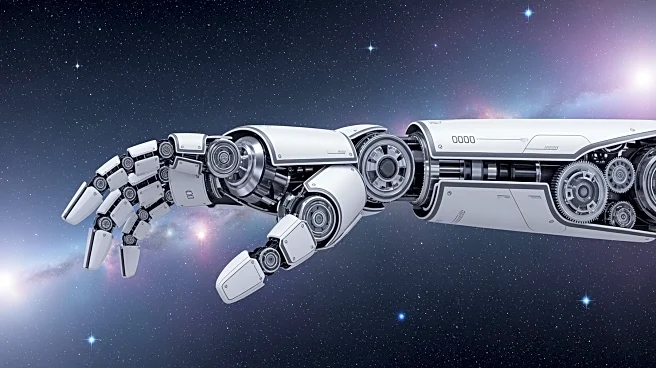What's Happening?
Harmonic Drive, a key player in the field of space robotics, is focusing on the challenges and innovations required for designing robots suitable for space applications. The company has a long history
of contributions to space missions, beginning with the Mariner 4 mission in 1964 and continuing through the Apollo missions, where it provided drive wheels for lunar rovers. In a recent discussion, engineer Chris Finger highlighted the extreme reliability required for space projects, often reaching 99.99%. He also noted the shift towards cost-effective satellite constellations by new space operators like SpaceX and Amazon. The technical challenges of designing for space, such as extreme temperature variations and vacuum conditions, were also discussed. Harmonic Drive's solutions offer flexibility in materials and configuration, which are crucial for these demanding environments.
Why It's Important?
The advancements in space robotics by companies like Harmonic Drive are crucial as the private sector increasingly focuses on space exploration and exploitation. The ability to design reliable and cost-effective robotic systems is essential for the success of future space missions, including in-orbit manufacturing and resource exploitation. This development not only supports the growing commercial space industry but also enhances the capabilities of space exploration missions. The innovations in robotics can lead to more efficient and sustainable space operations, potentially reducing costs and increasing the feasibility of long-term space projects. Stakeholders in the aerospace industry, including private companies and government agencies, stand to benefit from these technological advancements.
What's Next?
As the private sector continues to invest in space exploration, the demand for advanced robotic systems is expected to grow. Companies like Harmonic Drive will likely continue to innovate and refine their technologies to meet the evolving needs of space missions. The focus may shift towards developing more autonomous and versatile robotic systems capable of performing complex tasks in space. Additionally, collaborations between private companies and government agencies could accelerate the development and deployment of these technologies. The future of space exploration will likely see increased participation from private entities, driving further advancements in space robotics.
Beyond the Headlines
The development of space robotics also raises ethical and legal considerations, particularly regarding the exploitation of space resources and the potential impact on international space law. As private companies play a larger role in space exploration, there may be a need for updated regulations and agreements to ensure responsible and equitable use of space resources. Furthermore, the advancements in robotics could lead to shifts in workforce dynamics, with increased demand for skilled professionals in robotics and aerospace engineering.









